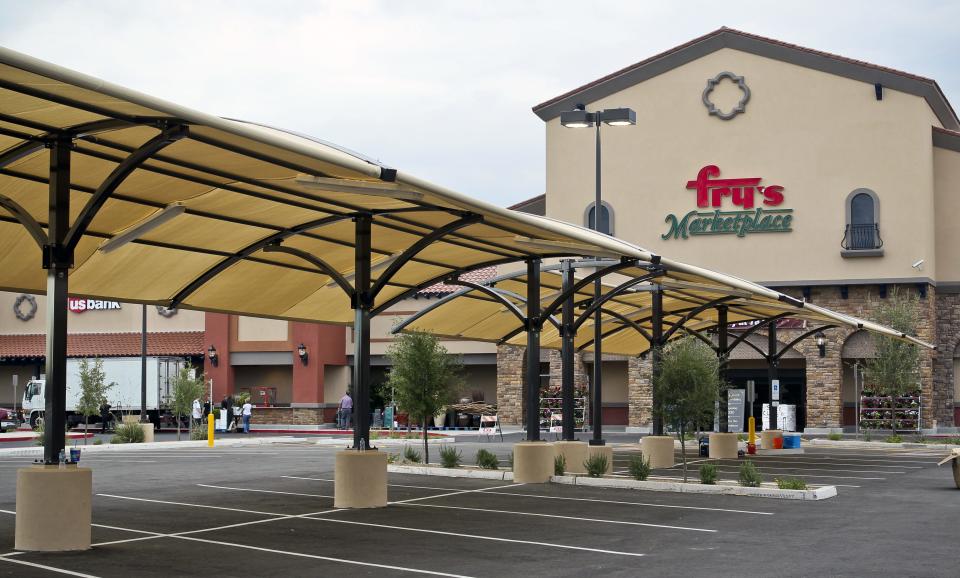In Arizona, Kroger-Albertsons merger would create a supermarket behemoth
Two of Arizona's supermarket giants plan to combine forces in a deal affecting more than 250 stores and in excess of 35,000 workers around the state.
A merger also would mean that just one company would control nearly half of the market for grocery stores in Arizona. There's a greater store overlap here than in many other states, which could raise anticompetitive concerns for regulators.
Kroger, which operates Fry's Food & Drug and other brands, said it will purchase Albertsons Cos. for $24.6 billion in a transaction announced Oct. 14 and expected to close in 2024. Albertsons operates Albertsons, Safeway and other grocery brands.
Both companies rank among the state's largest nongovernmental employers. Kroger ranked fourth overall in this year's Republic 100 report with more than 21,000 workers in Arizona, while Albertsons placed tied for sixth with 14,500.
Top executives of the two corporations cited a combination of synergistic cost savings, supply-chain efficiencies, broader product selections, expanded customer choices and other factors as catalysts behind the proposed combination.
The companies didn't cite specific impacts on particular states or overlapping locations.
However, they said divestitures are likely with between 100 and 375 stores, yet to be identified, to be transferred to a spin-off company — "a new, agile competitor with quality stores, experienced management, operational flexibility (and) a strong balance sheet."
Acquisitions: Kroger to acquire Albertsons for $24.6 billion deal
Broad Arizona reach for both stores

Albertsons operates 134 stores around Arizona, compared with 124 for Kroger. Among all states, Arizona's store count places it fifth in the Albertsons network behind California, Washington, Texas and Illinois. For Kroger, Arizona ranks ninth in the number of stores by state.
The combined companies would have nearly a 44% share of the Arizona grocery market, according to a 2019 analysis by Chain Store Guide. Walmart and Costco were the two next largest grocery competitors, with nearly a 26% share combined.
The combined Kroger and Albertsons heft nationally might raise concerns among the Federal Trade Commission which, among various actions, forced a downsized merger between Walgreens and Rite-Aid in 2017 and derailed a proposed merger between Rite-Aid and Albertsons the following year.
In addition to a substantial grocery presence in Arizona, Kroger and Albertsons also operate pharmacies, gasoline stations, distribution centers and food-processing manufacturing centers.
The proposed acquisition could have outsized relevance in Arizona, where prices for supermarket food and overall inflation have rung hotter than at the national level. Metro Phoenix led the nation in inflation among big cities with a 13% rate over the 12 months through August, the most recent measurement date for Phoenix.
Prices for food purchased at grocery stores have risen even faster here, up 15.7%, reported the federal Bureau of Labor Statistics.
New eats: 33 new restaurants and bars opened in metro Phoenix
Impact on customers, employees
In the merger announcement, top executives emphasized the mission to provide more fresh and affordable foods to a broader swath of Americans.
Along with Fry's, Kroger operates under supermarket brands that include Ralphs, Fred Meyer and Smith's, while Albertsons' other brands include Safeway, Vons and Jewel-Osco. Kroger operates in 35 states, compared to 34 for Albertsons. That would expand to 48 states once the merger concludes.
Combined, Albertsons and Kroger currently employ more than 710,000 workers in just under 5,000 stores, 66 distribution centers, 52 manufacturing plants, 3,972 pharmacies and 2,015 fuel centers.
The companies also pledged a "more personalized and convenient omnichannel experience including in-store shopping, enhanced pickup capabilities, faster delivery times and stronger digital capabilities," with a broader array of private-label brands. In addition, they announced plans to invest $500 million to reduce prices and $1.3 billion to upgrade stores in the Albertsons network.
In 2021, Cincinnati-based Kroger earned a profit of nearly $1.7 billion on $138 billion in sales. Albertsons, headquartered in Boise, Idaho, generated net income of $1.6 billion on nearly $72 billion in sales.
Business as usual, for now
Until the transaction closes, the two corporations will remain separate entities with no perceived changes from the standpoint of customers. That includes business as usual as it pertains to loyalty programs, gift cards, promotions, coupons and so on.
"We encourage you to continue earning and using your points at our stores, fuel centers, pharmacies as well as online," Kroger said. For now, rewards and other programs offered by the two companies "remain separate, and you cannot use your Kroger customer program at Albertsons Cos. stores or on their digital platforms."
Once combined, the companies plan to invest $1 billion to continue raising employer wages and improving benefits following close of the transaction. The companies said the merger "secures union jobs" and will result in "new and exciting career opportunities."
With an eventual customer base of roughly 85 million households, the combined company expects to have greater opportunities to use Kroger's data-science capabilities to offer more relevant and personalized recommendations and promotions.
Reach the reporter at russ.wiles@arizonarepublic.com.
Support local journalism. Subscribe to azcentral.com today.
This article originally appeared on Arizona Republic: Kroger-Albertsons merger could raise concerns about competition in AZ

